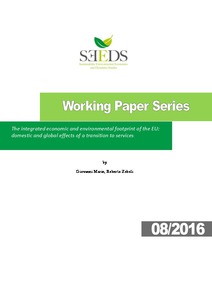The integrated economic and environmental footprint of the EU: domestic and global effects of a transition to services

Marin, Giovanni ; Zoboli, Roberto
Sustainability Environmental Economics and Dynamics Studies, Ferrara
SEEDS - Ferrara
2016
31 p.
climate change ; economic system ; environmental policy ; service sector ; structural change
Working Papers
08/2016
Service sector
http://www.sustainability-seeds.org/
English
Bibliogr.
"The structural change of the economy towards an increasing share of services is seen in environmental economics as a fundamental driver of ‘decoupling' between economic growth and environmental pressures. The environmental and socio-economic consequence of structural change, however, can be less straightforward when economic interdependencies are considered. In this paper we evaluate the implications of structural change towards services in the EU in terms of environmental pressures (aggregate and by sector, direct and indirect). The changing patterns in environmental pressures are analyses vis à vis the corresponding changes in the distribution of employment and value added. For carrying out this integrated assessment we use Environmentally Extended Multi Regional Input Output modelling applied to data from the World Input Output Database (WIOD). The results suggest that the service sectors is characterized by a lower emission intensity than the industrial sectors, when looking at direct emissions (‘production perspective') but this gap is much smaller when considering also indirect emissions in a ‘vertically integrated' approach (‘consumption perspective'). Moreover, changes in the production structure of the EU economy in absence of relevant changes in the composition of the final demand induce an increased reliance on environmental pressures, employment and value added generated abroad. The integrated assessment of these ‘global footprints' suggests that the EU is transferring worldwide more emissions that value added and employment. This form of ‘unequal exchange' can be relevant for development and environmental policies, in particular those on global climate change."
Digital
The ETUI is co-funded by the European Union. Views and opinions expressed are however those of the author(s) only and do not necessarily reflect those of the European Union or the ETUI.